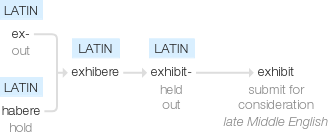Exhibit
late Middle English (in the sense ‘submit for consideration’, also ‘present a document as evidence in court’): from Latin exhibit- ‘held out’, from the verb exhibere, from ex- ‘out’ + habere ‘hold’.
wiktionary
From Latin exhibitus, perfect passive participle of exhibeō(“I hold forth, present, show, display”), from ex(“out of, from”) + habeō(“I have, hold”); see habit.
etymonline
exhibit (v.)
"offer or present to view," mid-15c., from Latin exhibitus, past participle of exhibere "to hold out, display, show, present, deliver," from ex "out" (see ex-) + habere "to hold" (from PIE root *ghabh- "to give or receive"). Related: Exhibited; exhibiting.
exhibit (n.)
1620s, "document or object produced as evidence in court," from Latin exhibitum, noun use of neuter past participle of exhibere "to display, show," "to show, display, present," literally "hold out, hold forth," from ex "out" (see ex-) + habere "to hold" (from PIE root *ghabh- "to give or receive"). Meaning "object displayed in a fair, museum, etc." is from 1862. Transferred use of exhibit A "important piece of evidence" is by 1906.
